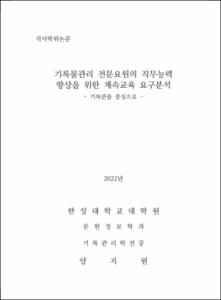기록물관리 전문요원의 직무능력 향상을 위한 계속교육 요구분석
= Needs Assessment of Continuing Education for Improving Work Performance of Records Managers
- Type
- Thesis
- Alternative Title
- 기록관을 중심으로
- Advisor
- 박지영
- Department
- 대학원 문헌정보학과
- Issued Date
- 2022
- Publisher
- 한성대학교 대학원
- Keyword
- 계속교육; 기록물관리 전문요원; 교육 요구분석; Borich 요구도; The Locus for Focus 모델; 교육필요성; 직무분석
- Files in This Item:
-
-
Download
 200000592851.pdf
기타 데이터 / 1.36 MB / Adobe PDF
200000592851.pdf
기타 데이터 / 1.36 MB / Adobe PDF
-
Items in Repository are protected by copyright, with all rights reserved, unless otherwise indicated.